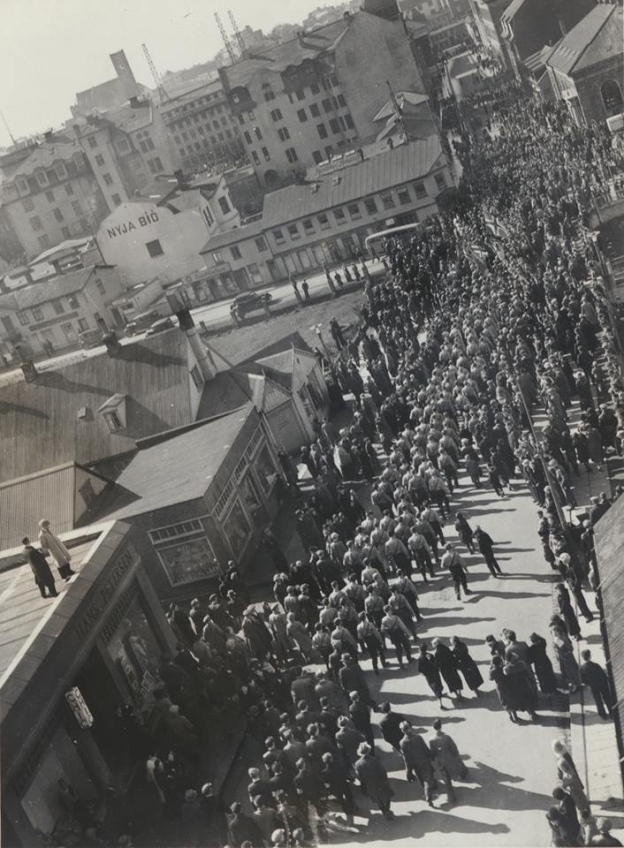While Iceland was closing its harbors and restricting certain professions to Icelandic citizens, many Icelanders also viewed Hitler and [Fascism] as a possibl[e] key to gaining their independence.
In 1939, three pro‐Nazi Icelanders visited a [Fascist] prince, Friedrich Christian zu Schaumburg‐Lippe, and asked him to become the King of Iceland in case their hoped‐for [Fascist] takeover of Iceland materialized. The prince, a member of the [NSDAP] since 1929 and an official of the Third Reich, took this request seriously and brought it to Joseph Goebbels.
According to the prince’s autobiography published in 1952, Goebbels liked the idea but Foreign Minister von Ribbentrop dismissed it.¹⁸
[…]
A few Icelandic members of the Waffen‐SS fought for [the Third Reich], and a few Icelanders served in concentration camps in 1943–1944, including one who served as a guard at the notorious Dora‐Mittelbau camp in Germany, also known as Dora‐Nordhausen.⁴¹
There were also non‐Jewish Icelanders living abroad who were killed in concentration camps because their [Fascist] countrymen in, for instance, Norway and Germany had informed on them regarding their political views.
Most Icelanders who served in the Third Reich were treated with contempt after the war.⁴² However, there was a lapse of memory when it came to the former members of Iceland’s own Nazi Party. After the war, some of them quickly attained high positions in society, including a couple of chiefs of police, a bank director, and some doctors.
(Emphasis added. Click here for more.)
In 1933, a small Nazi Party was founded in Iceland. In 1934, it became a National Socialist Party, Flokkur Þjóðernissinna (the Nationalist Party) with connections to the [NSDAP].
The party never gained enough popularity to obtain seats in the parliament, and it gradually dissolved and mixed with other political parties in 1938. Like many other Icelandic politicians, the leading [Fascists] of Iceland wanted to preserve the alleged purity of the Icelandic race.
Although the party could not make Icelandic Jews their archenemies, since there were so few Jews in Iceland, they saw Jews and Jewish conspiracies everywhere. In one of the [Fascist] pamphlets, the politician Ólafur Thors was called “an honorable rabbi”.
His father, Thor Jensen, had risen from poverty as an orphan in Copenhagen to become the wealthiest man in Iceland. It was not, and still is not, uncommon in Iceland to hear and see the terms Gyðingar and Júðar attached to wealty individuals with negative connotations.
Although the few Jewish refugees in Iceland had no significant problems with the Icelandic [Fascists], they had a basic problem with the nationalistic Icelandic authorities. The Jews were simply not welcome in this country.
[…]
In 1997, it did not make headlines in Iceland when it became known that in the late 1930s the Icelandic authorities had offered to pay for the further expulsion of Jews to [the Third Reich], if the Danish authorities would not take care of them after they had been expelled from Iceland[.]
[…]
In 1994–1995, the Icelandic daily Morgunblaðið published a series of letters to the editor by an Icelandic Holocaust denier. An Icelandic neo‐Nazi participated in the ensuing debate, and wrote in response to one of the few critics of the Holocaust denier: “the goal of [his] article is to destroy the Icelandic nation, because he doubts the importance of the Icelandic language, our beautiful mother tounge. It is barbaric to want to destroy one’s nation, and not wish for the success of the Aryan race. The truth will be revealed, this discussion is just beginning.”⁴⁵
[…]
Evald Mikson, an Estonian war criminal who was assisted by Swedish authorities to escape prosecution, ended up in Iceland when the ship that was carrying him from Sweden to the United States ran aground there. He was, like many other foreigners in Iceland, never fully accepted as an Icelander, even with his brand new Icelandic name, Eðvald Hinriksson. It helped, however, that his sons were members of Iceland’s national soccer team and, later, successful professional players for famous teams abroad.
Many Icelanders were ready to believe the lies Mikson told in his biography, published in Iceland in 1988,⁴⁷ about his rôle in WWII Estonia. A request by [a] branch of the Simon Wiesenthal Center that the Icelandic authorities investigate Mikson’s case sparked sharply negative responses. […] Efraim Zuroff, director of the Simon Wiesenthal Center in Jerusalem, was proclaimed one of the main enemies of Iceland because of his wish to have Mikson prosecuted.⁵⁰
[…]
Evald Mikson died in 1993, shortly after the Icelandic government and the state prosecutor finally decided to take into account all the evidence they had received from the Wiesenthal Center and Estonian archives. […] In a sinister response to Zuroff’s reaction⁵² to [an] interview with Edvaldsson and the incorrect information it contained, the editors of Morgunblaðið claimed that the evidence against Mikson was not reliable because some of it originated with the KGB.⁵³
(Emphasis added. I had to cut out a lot of crap not only to make the reading briefer but also because Vilhjálmur Örn Vilhjálmsson is, sadly, an apologist for neocolonialism.)


